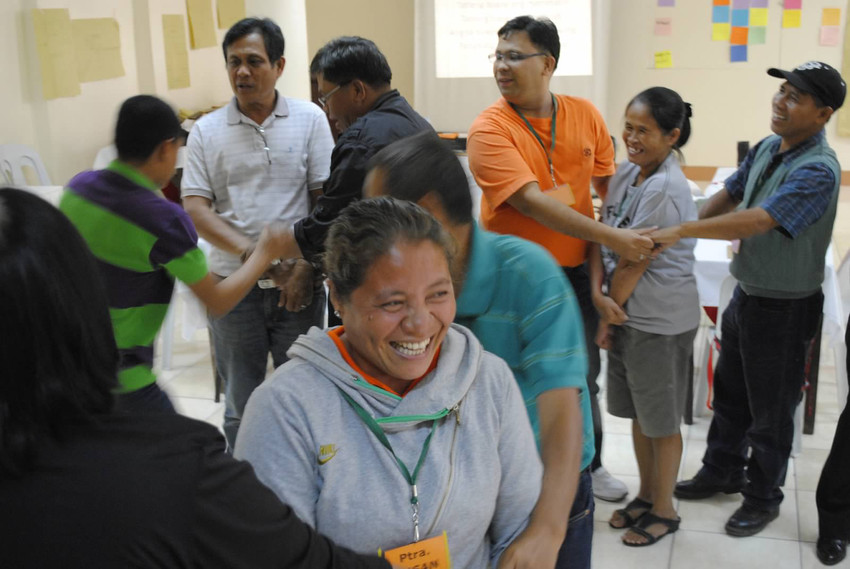
Pastor Jesusa Garba and other Filipino pastors play a group game as part of Trauma Healing and Disaster Risk Reduction training in Ormoc, Leyte Province, sponsored by Peacebuilders Community, Inc. (MCC Photo/Jeanne Jantzi)
AKRON, Pa.
When Typhoon Haiyan struck the Philippines in November 2013, it not only left a trail of ruined homes, flattened businesses and uprooted trees, it caused emotional trauma for many in the disaster’s path.
This included pastors and other caregivers who would be called upon to help people in their churches as soon as the wind, rain and storm surges subsided.
“I felt so helpless. I didn’t know how to protect my family,” Pastor Janar Ruiz says. “We all went to the church during the typhoon and we couldn’t do anything but cry.”
In the week after the storm, Peacebuilders Community Inc. (PBCI), a Mennonite Central Committee (MCC) partner, did an assessment with church leaders in Ormoc City, Leyte Province, and realized pastors would need assistance. PBCI is a local Filipino organization and a ministry of Mennonite Church Canada Witness with ties to the Integrated Mennonite Church of the Philippines.
Based on the assessment, PBCI developed a plan to provide 50 pastors with an opportunity to talk about their experiences and to be trained in immediate trauma counselling, disaster risk reduction and peace and reconciliation. MCC supported the assessment and the plan.
Feb. 4–6, a group of pastors from the Philippines Council of Evangelical Churches met in Ormoc City for the first training. Clinical psychologist Bennette Tenecio lead pastors in several rounds of sharing about their feelings during the typhoon and afterward.
Pastor Jonathan Pobadora, who lost his home and whose family is still living in a tent three months after the typhoon, found new meaning in his emotions. “Fear is what allowed us to survive,” he says. “We evacuated and stayed away from danger areas. God made us survivors by giving us fear. I am thankful for these emotions.”
The training in trauma counselling prepared the participants to walk alongside people who are suffering after disaster or tragedy. Tenecio offered phrases that can help calm and communicate caring: “Is there anything you want to tell me about what happened?” “How is your family doing?” “Is there anything you need right now?”
The training also helped pastors, who historically have not looked to each other for support, to establish closer personal connections, said Jeanne Jantzi, who attended the training in her role as an MCC area director for Southeast Asia.
PBCI facilitator Boyet Ongkiko challenged the pastors to get involved in their village’s disaster response rather than create parallel structures only for churches. “Holiness does not mean separation from the community,” he told them. “If you are too busy in church activities, you don’t have time for the community.”
The group of 16 men and four women strategized how to organize effective disaster responses involving church and government agencies.
The group will meet again for a second training in peace and reconciliation. When all 50 pastors are trained, each will pass on what they learned to four others, reaching a total of 200 pastors.
Melanie Hess is a freelance writer from Lancaster, Pa. Jeanne Jantzi, an MCC area director for Southeast Asia, contributed to this story.
View the story at http://mcccanada.ca/stories/news/supporting-pastors-face-trauma